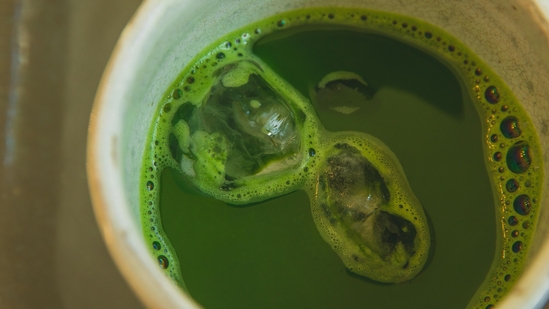Having matcha tea improves sleep as you age? Here's what a study from Japan found
A study found that matcha consumption significantly improved emotional perception in older adults with mild cognitive decline.
Matcha tea is a finely ground powder made from specially grown and processed green tea leaves. It was earlier popular in Japan but is now enjoyed worldwide because of its health benefits. A study published in PLOS ONE has given an insight into matcha green tea's effects on cognitive decline in older adults and revealed some promising results. Here's what was found. Also read | Want to ‘shrink waistline’? Doctor advises drinking matcha to lose an inch of your belly

Matcha tea linked to better emotional perception
The yearlong study of older adults with cognitive decline in Japan found that drinking matcha green tea improved participants’ emotional perception and sleep quality. The study included Japanese older adults between 60 and 85 years of age.
Matcha is rich in antioxidants, particularly catechins, which are believed to help neutralise harmful free radicals and may contribute to overall health.
Can drinking matcha lead to better sleep quality?
Study author Kazuhiko Uchida and his colleagues set out to examine the effects of matcha capsules, a dietary supplement, on cognitive functioning and sleep quality in older individuals with subjective or mild cognitive decline.
The results showed that matcha supplementation improved participants’ emotional perception, as measured by tests requiring the identification of facial emotions. Having matcha green tea also showed a trend toward improving sleep quality, although the results were not dramatic. However, matcha consumption did not significantly affect overall cognitive functioning or daily living abilities in the study participants.
More about the study
Participants were recruited from the University of Tsukuba Hospital and the Memory Clinic Toride, both in Japan. To be eligible, participants had to live with a partner who could help manage supplement intake and accompany them to appointments.
They also had to have either subjective cognitive decline or mild cognitive impairment, have no serious illnesses in the past five years, and not be diagnosed with dementia or taking dementia treatments. The study included 64 participants with subjective cognitive decline and 35 with mild cognitive impairment.
Note to readers: This article is for informational purposes only and not a substitute for professional medical advice. Always seek the advice of your doctor with any questions about a medical condition.
Catch your daily dose of Fashion, Taylor Swift, Health, Festivals, Travel, Relationship, Recipe and all the other Latest Lifestyle News on Hindustan Times Website and APPs.
Catch your daily dose of Fashion, Taylor Swift, Health, Festivals, Travel, Relationship, Recipe and all the other Latest Lifestyle News on Hindustan Times Website and APPs.






